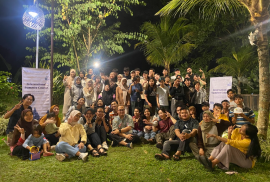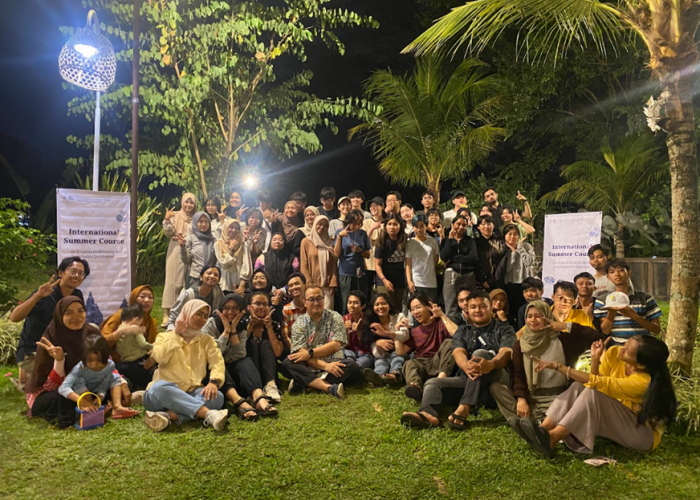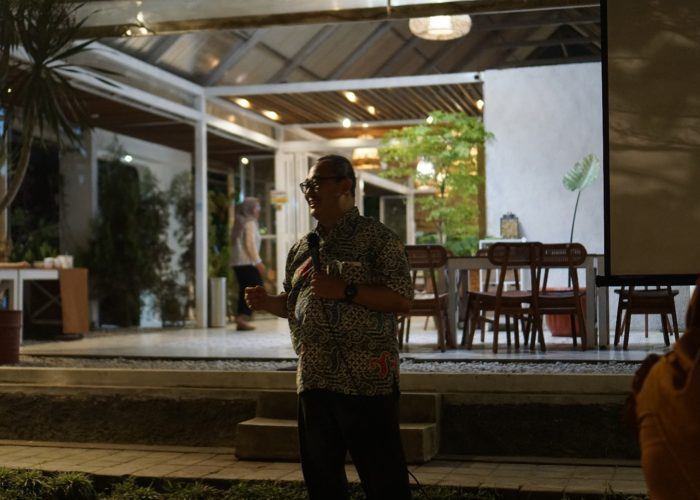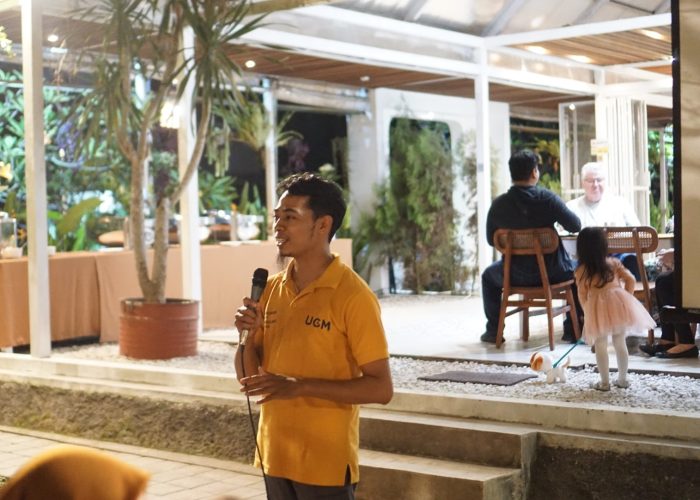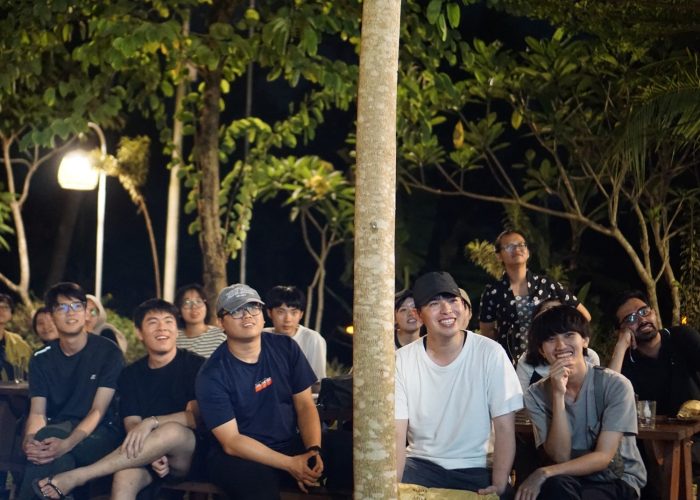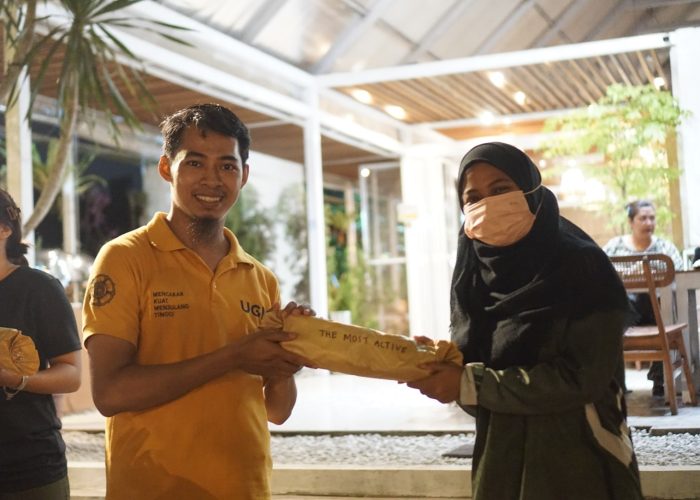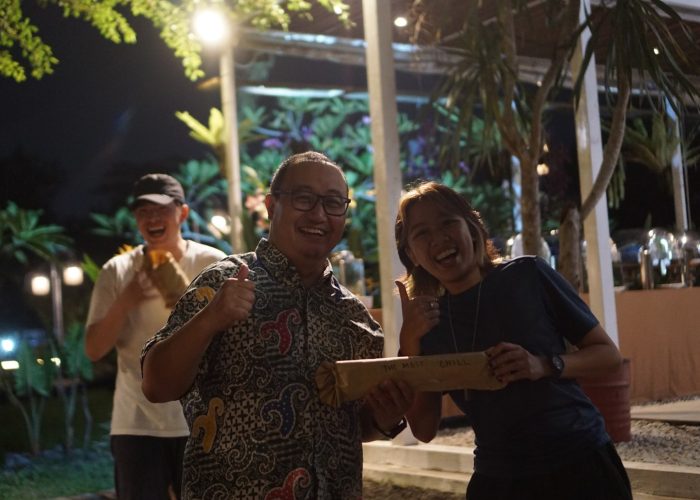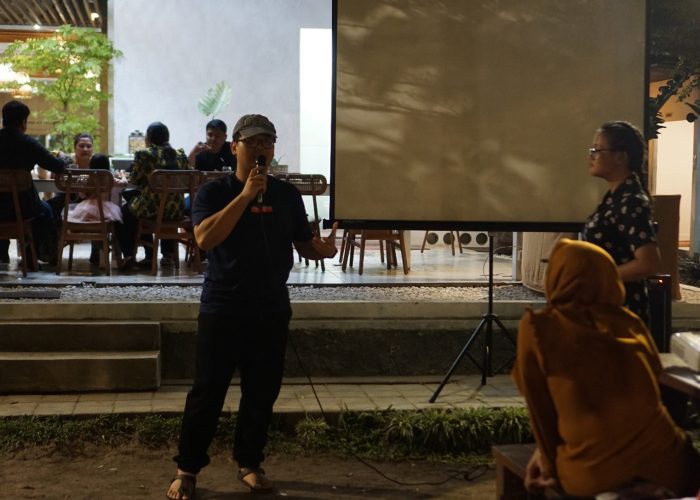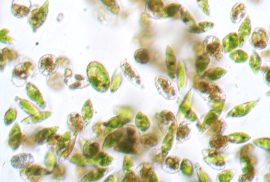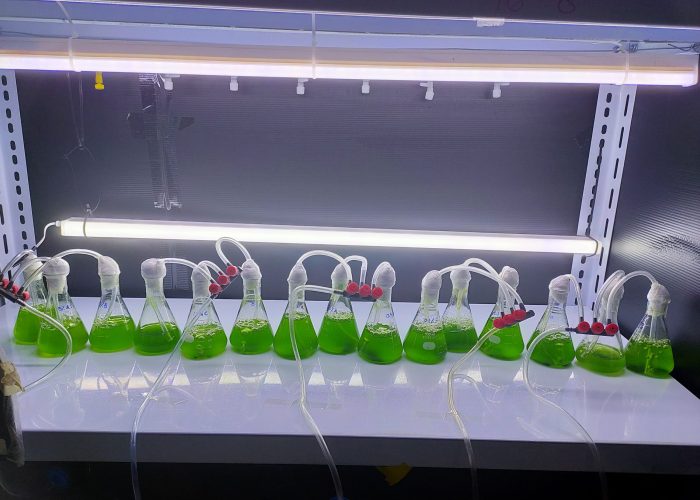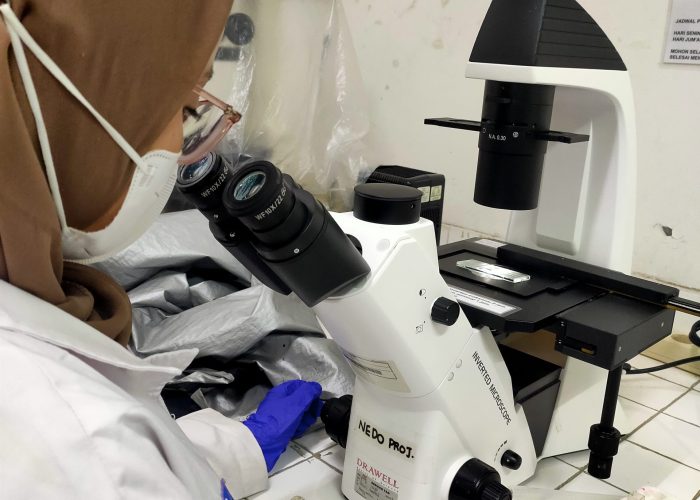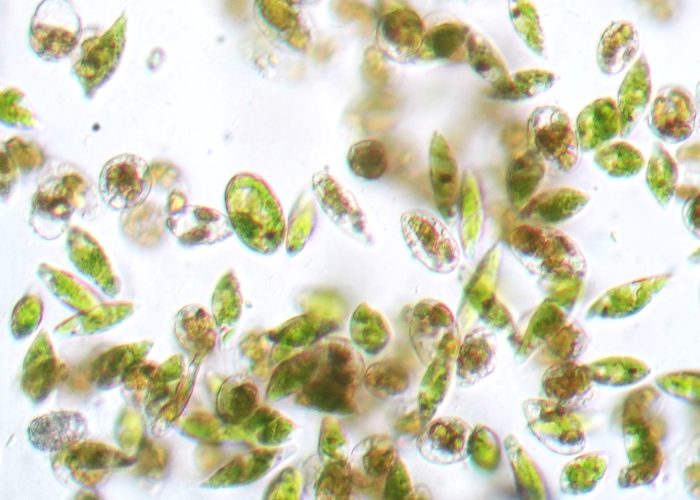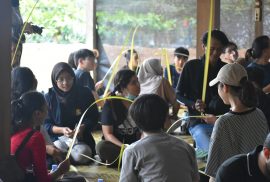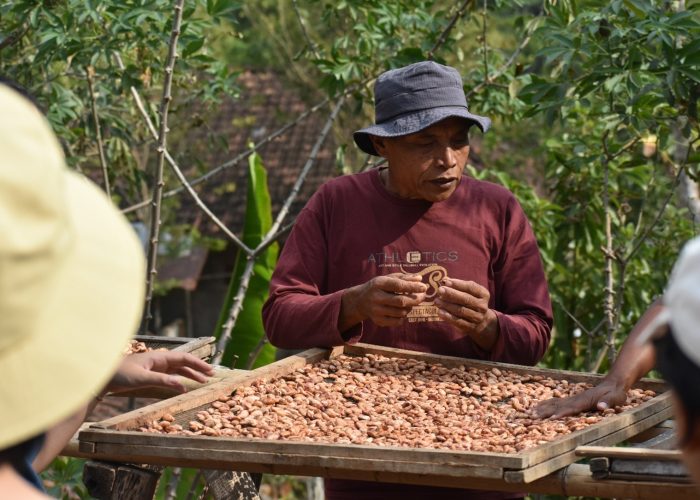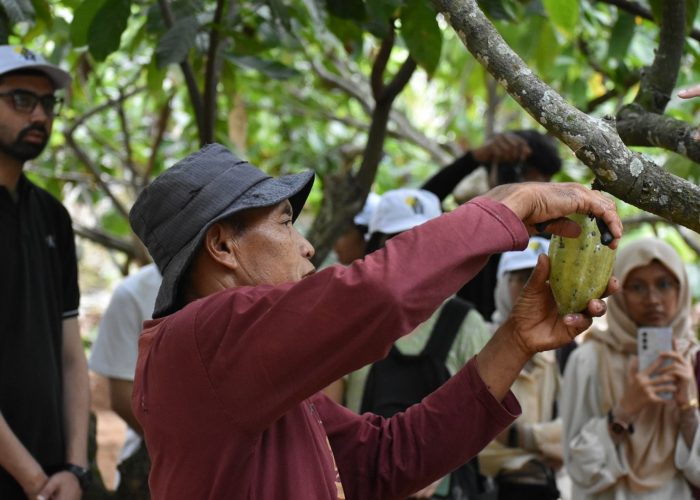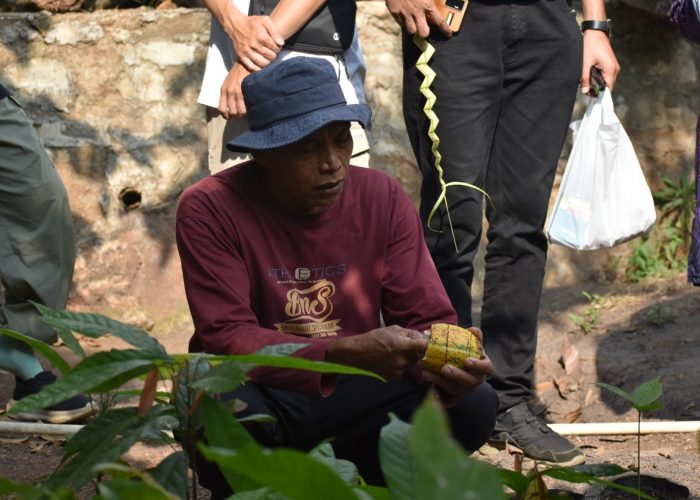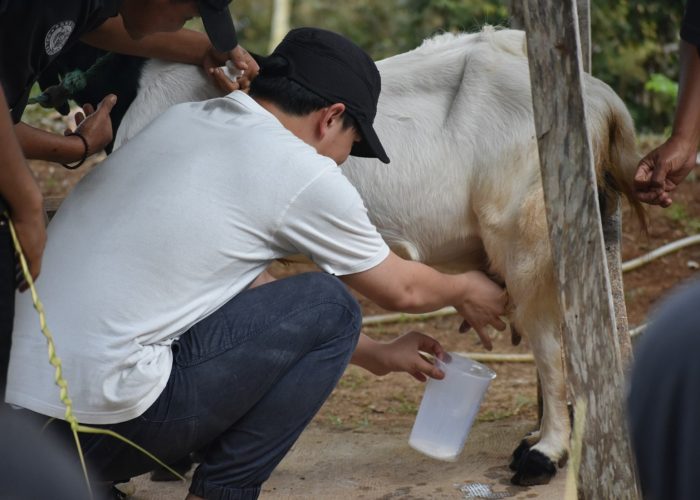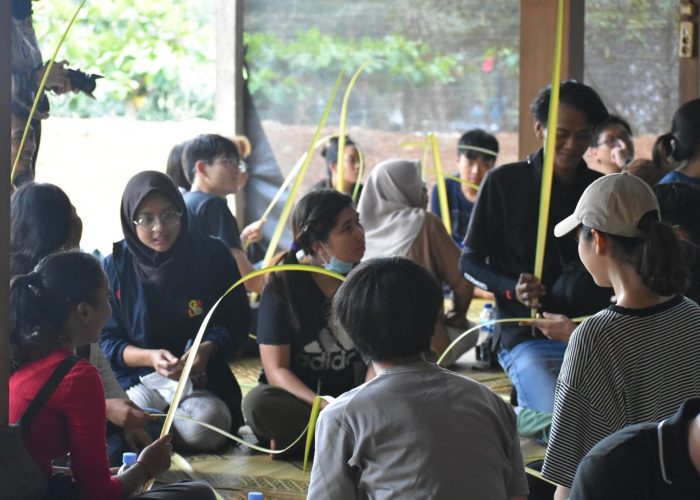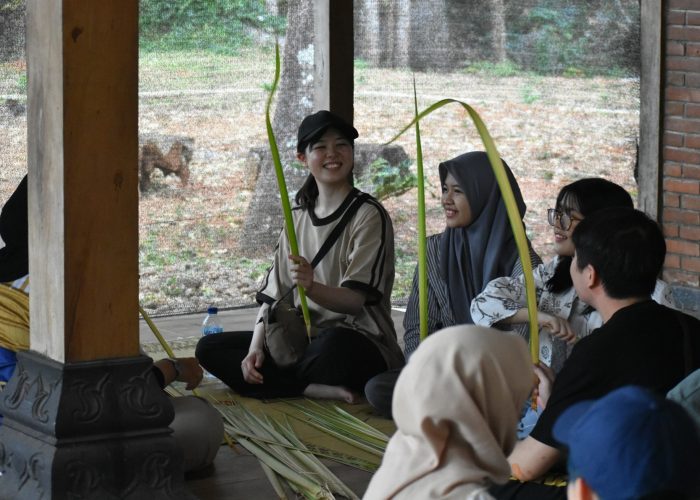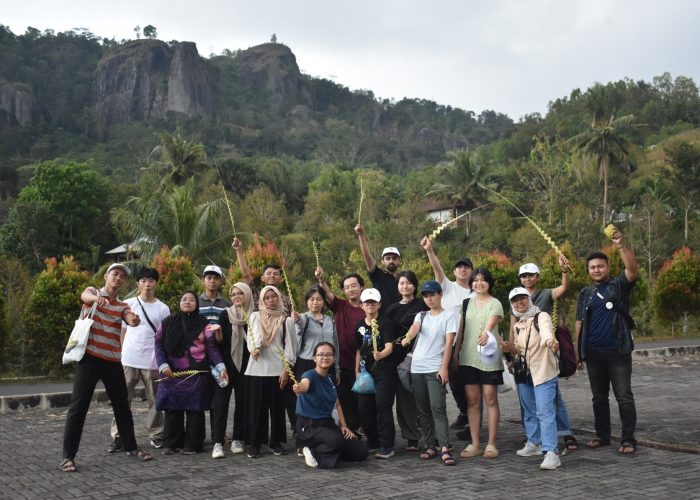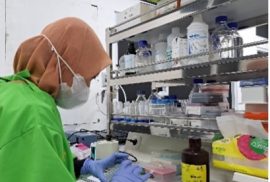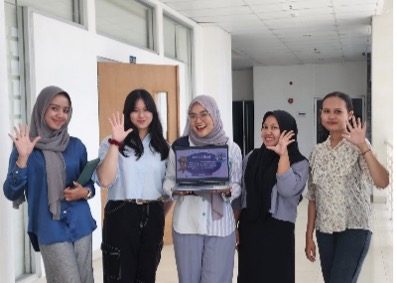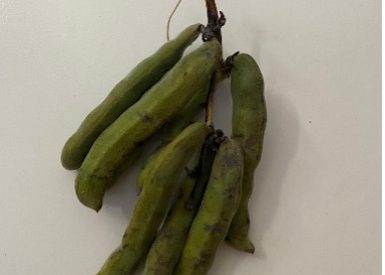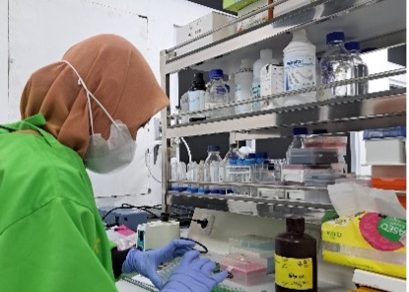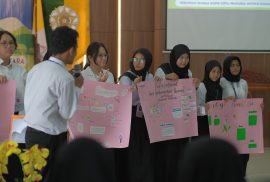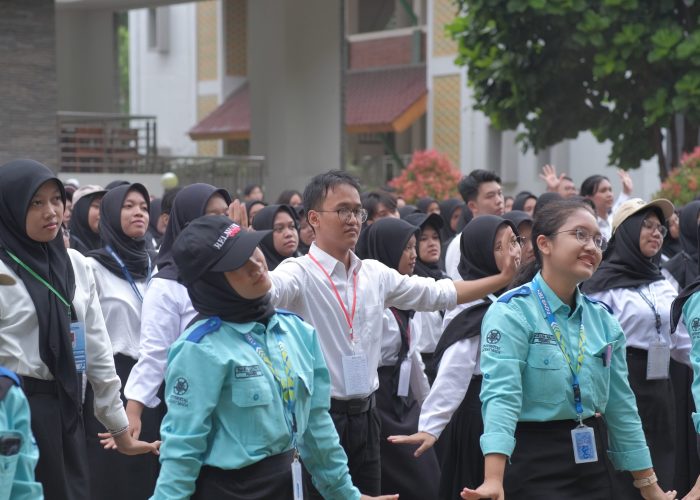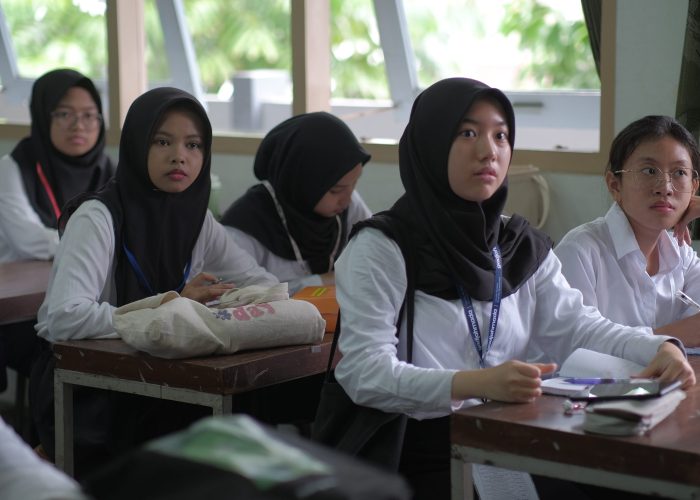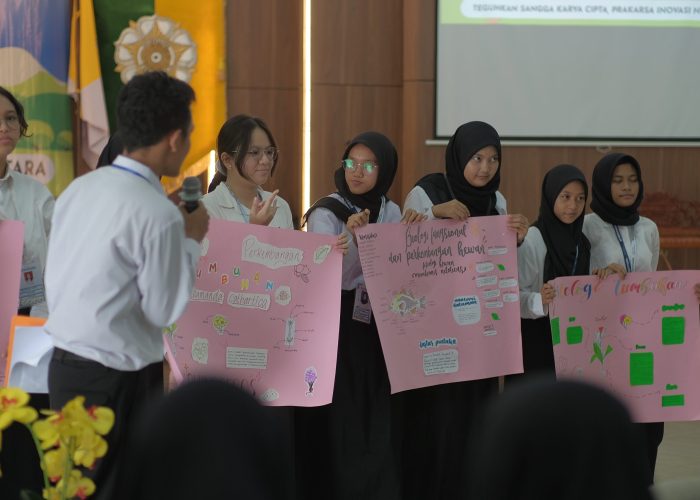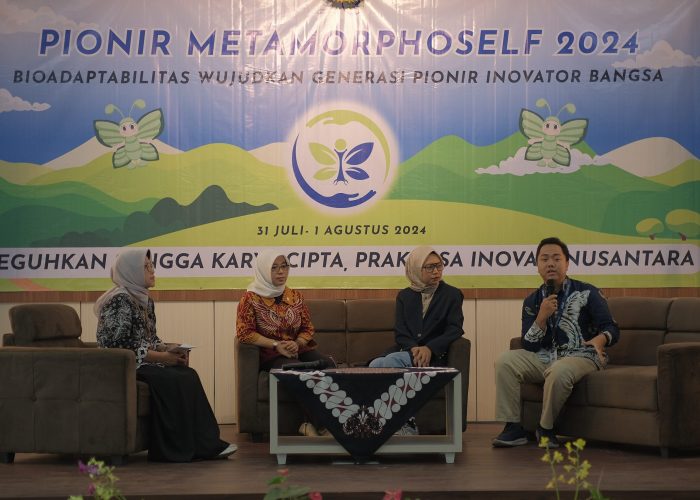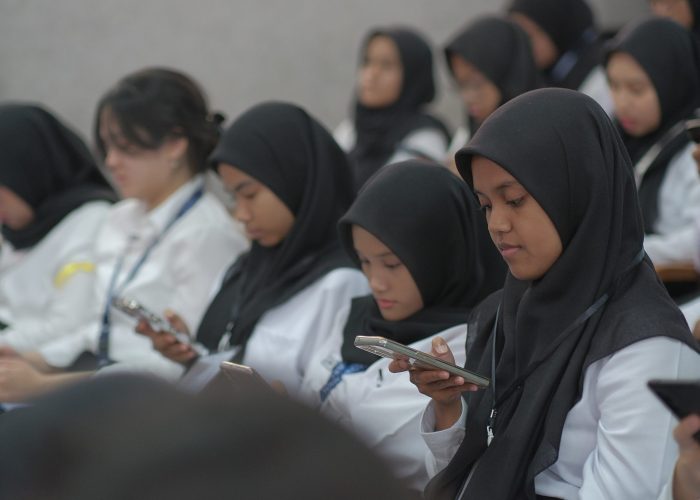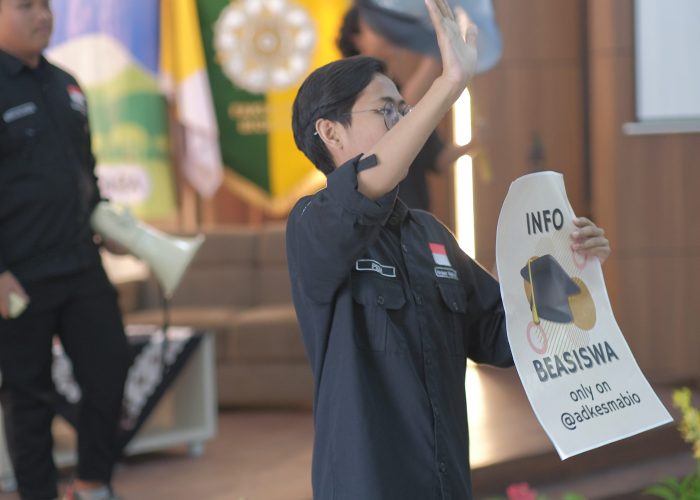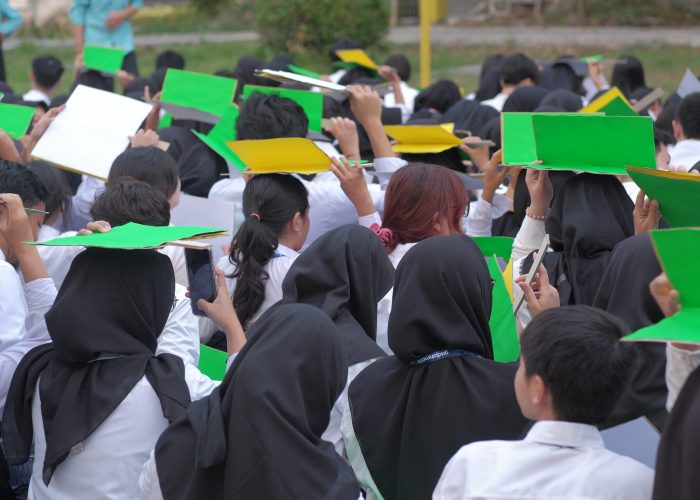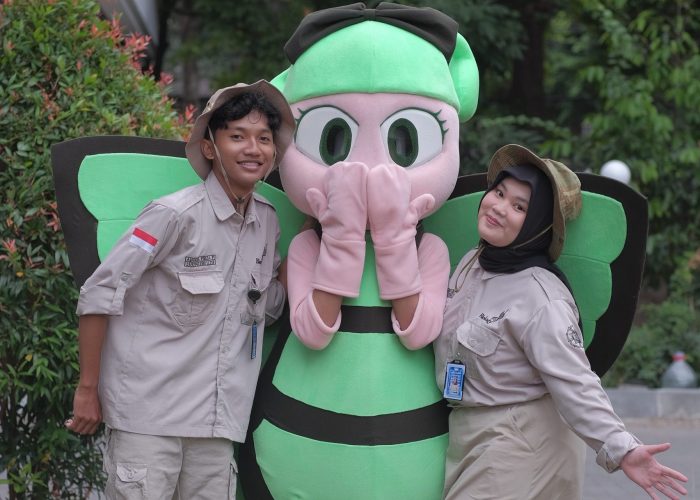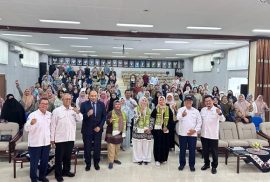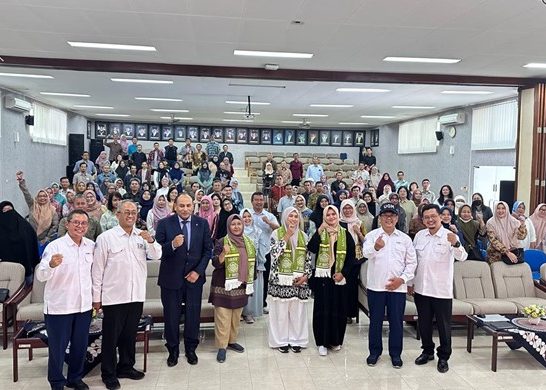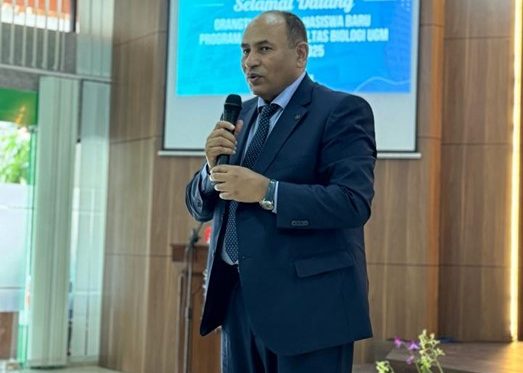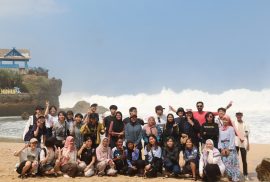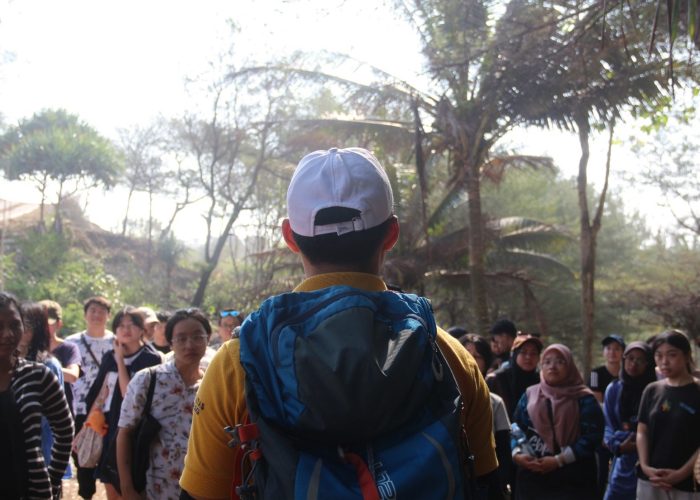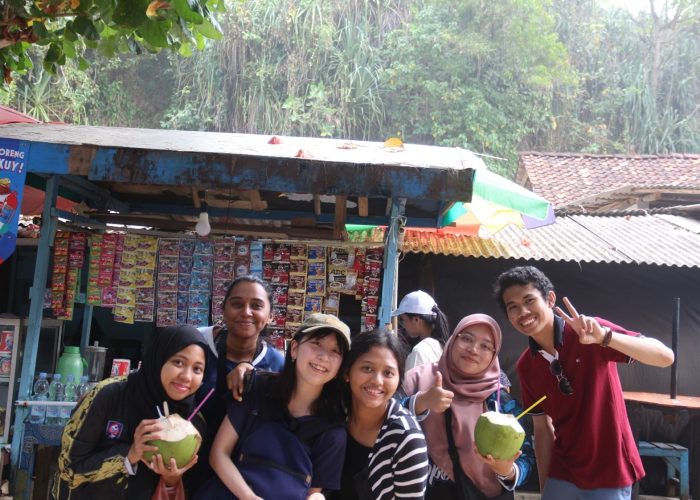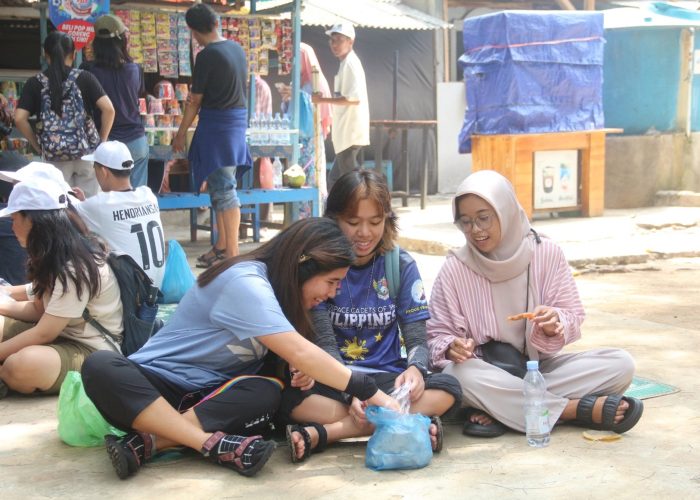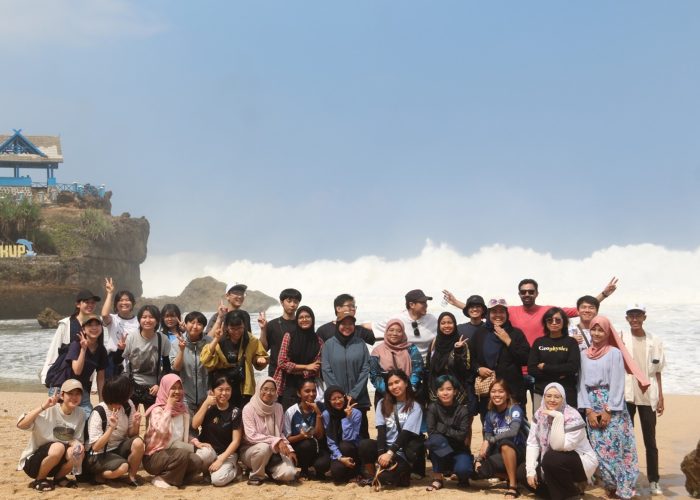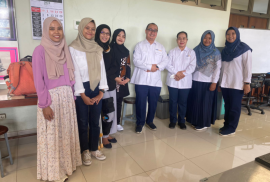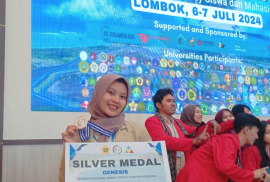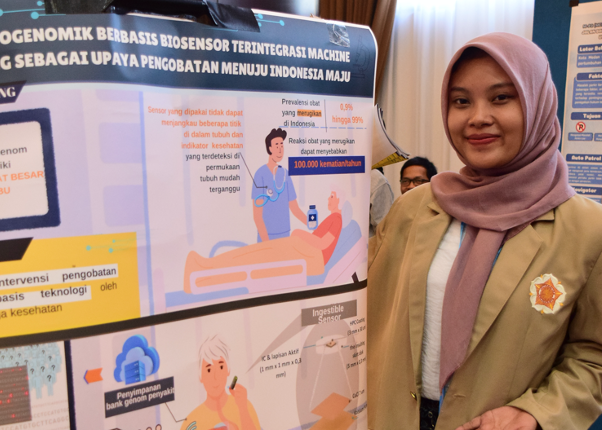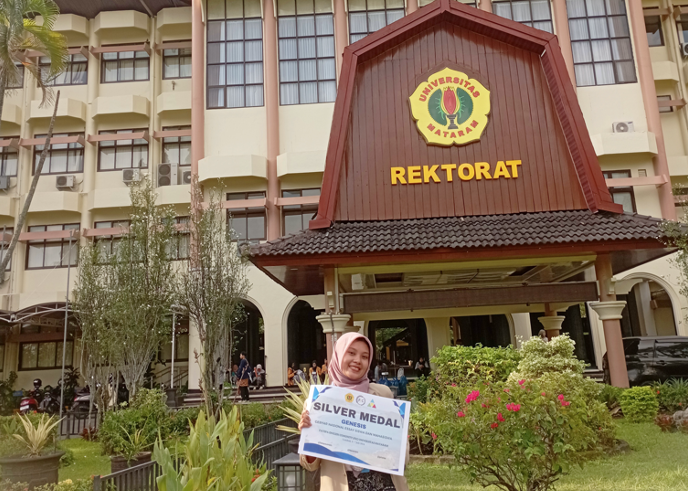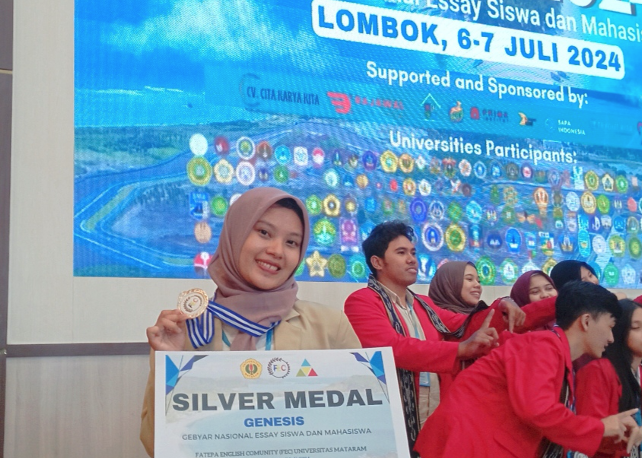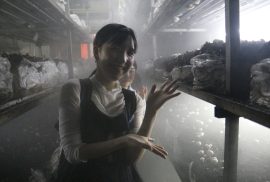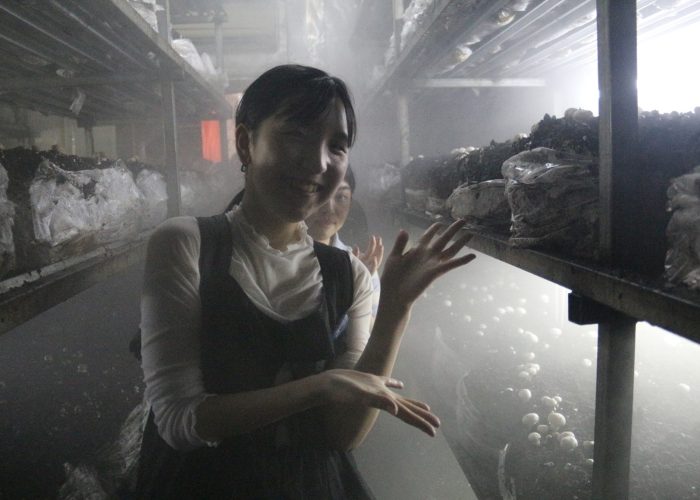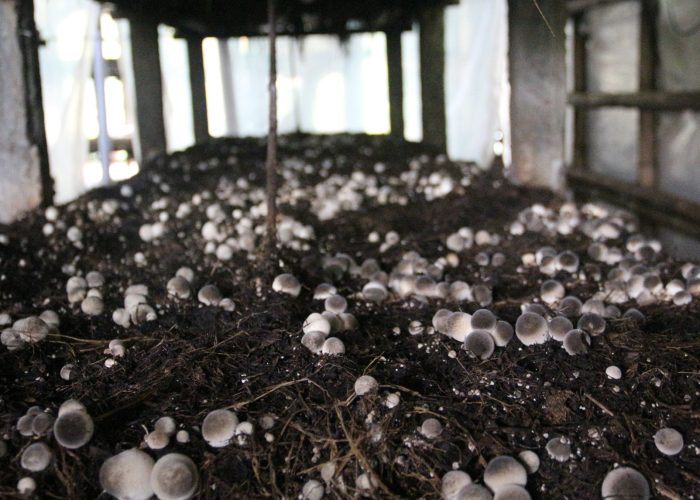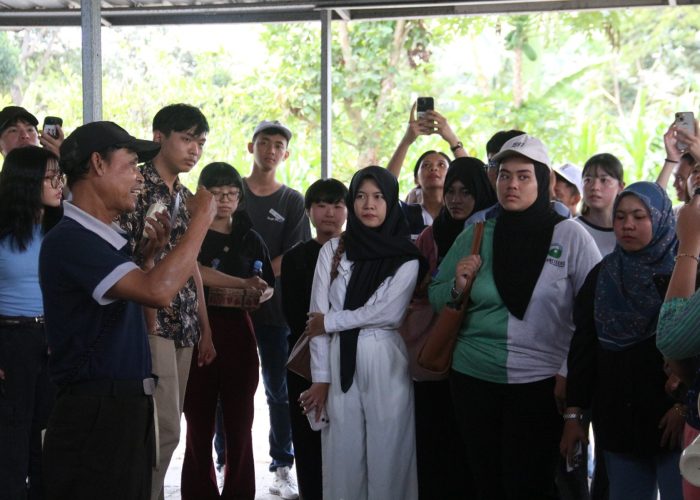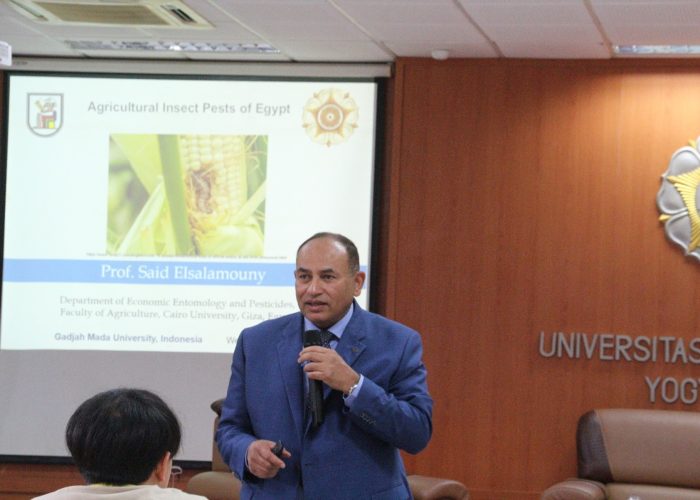Arsip:
SDG 4 : Provide Quality Education
Yogyakarta, 2 August 2024 – The 7th International Summer Course in Sustainable Development: Sustainable Bioprospecting of Tropical Biodiversity in 2024 has finished. The closing of the Faculty of Biology UGM’s annual agenda was held at Padiku Coffee and Eatery, Sleman, Yogyakarta, attended by Dr. Eko Agus Suyono, M.App.Sc. as Vice Dean for Research, Community Service, Collaboration and Alumni Affairs as well as General Chair of the ISC Program, Mukhlis Jamal Musa Holle, M.Eng.Env., D.Phil. as Chief Executive of ISC, all lecturers and organizing committee, as well as summer course participants who have completed a series of summer courses both online and offline.
Participants from each university and country took turns presenting testimonials and experiences throughout the summer course. They expressed their appreciation and enjoyable experiences during the summer course series, especially the offline and field agendas which provided new experiences for those from different countries. Appreciation awards were then given to participants who actively participated in the activities.
The screening of the compilation video for the 7th International Summer Course in Sustainable Development agenda was then held. The participants were enthusiastic about reminiscing about the series of activities they went through together.
Mukhlis Jamal Musa Holle, M.Eng.Env., D.Phil. as Chief Executive of ISC expressed his thanks to all participants who had taken part in the summer course activities until completion. It is hoped that this summer course can be an enjoyable experience and become a forum for various experiences and stories.
Dr. Eko expressed his appreciation for the implementation of this year’s summer course, starting from the online and offline lecture agenda, exploring local culture such as the Sultan Palace and Sonobudoyo museum, various trainings, to exploring the beach and studying local bioprospecting products. The International Summer Course held by the Faculty of Biology UGM has reached its 7th year. It is hoped that in the future there will be many innovations and wider collaboration with various world universities.
Greetings from Dr. Eko also closed the ISC this year. The implementation of ISC cannot be separated from the contributions of various parties, participants and resource persons from various universities and countries, presenting themes according to their scientific fields. It is hoped that ISC can become a forum for various and expand collaboration and sustainable knowledge.
According to data from the World Health Organization (WHO), 149 million children worldwide suffer from stunting. This condition can lead to high mortality rates, low Intelligence Quotient (IQ) and immune system function, and an increased risk of various metabolic syndromes. One effort to prevent stunting is by providing beneficial macro and micronutrients for child development. These nutrients can be obtained through superfoods, nutrient-dense foods that support health derived from bioactive compounds found in fruits and vegetables. However, the availability of superfoods faced many challenges. Therefore an alternative to superfoods is needed.
Euglena is a candidate for superfood because it is safe for human consumption and can thrive in various environmental conditions. It produces essential amino acids, polyunsaturated fatty acids (PUFAs), and bioactive metabolites. Unfortunately, its metabolite production is lower than superfoods, necessitating a polyploidization to enhance metabolite production. Naturally, Euglena only produces about 44 micrograms/milligrams of polyunsaturated acid, 47% amino acids, and approximately 100 mg of paramylon.
Addressing this issue, five UGM students from different disciplines—Novia Noor Rachmawati (Biology 2020), Tiara Amelia Putri (Biology 2020), Haris Dwi Nugroho (Biology 2021), Sabrina Gita Pramesti (Chemistry 2021), and Tabina Amanda Aurelia Surya (Chemical Engineering 2022)—are exploring the potential of a stunting-preventing superfood from local Euglena sp. microalgae. They employ colchicine-induced polyploidy genetic breeding methods to alter the organism’s chromosome set. The students are part of UGM Student Creativity Program (PKM) in the Exact Sciences Research category, under the guidance of Prof. Dr. Budi Setiadi Daryono, M.Agr.Sc.
Novia explained, “We use the polyploidization process because it can enhance the expression of functional genes and consistently pass down its mutated characteristics to subsequent generations. Therefore, we analyzed the performance, ploidy level, and metabolomic study of colchicine-mutated local Euglena sp. as an alternative source of essential amino acids and value-added bioproducts.”
Haris revealed that the Euglena sp. model was sourced from Dieng, Central Java, with concentration variations from 0% to 5% and an induction time of 24 hours. The goal is to obtain polyploid Euglena with improved morphology, DNA concentration, ploidy level performance, and amino acid and metabolite profiles.
Sabrina, who comes from a different scientific background than the other members, explained that an effective treatment to induce chromosomal ploidy mutations in Euglena sp. at a 1% concentration increases ploidy levels, carbohydrate production, paramylon, chlorophyll, carotenoids, and three essential amino acids (L-lysine, L-leucine, and L-histidine).
Novia, the team leader, added that further testing of the concentrations of each treatment showed an increase in amino acids, particularly in the essential amino acids L-Lysine, L-Leucine, and L-Histidine, which had the highest concentrations. These essential amino acids play a crucial role in preventing stunting as they function in bone development, immune system enhancement, and red blood cell formation. “We hope this research will be beneficial and contribute to the development of genetic modification in Euglena sp., adding to the body of knowledge on microalgae biotechnology, and positioning Euglena sp. as a high-value alternative protein bioproduct,” concluded Novia.
Yogyakarta, 2 August 2024 – The last day of the agenda for The 7th International Summer Course in Sustainable Development: Sustainable Bioprospecting of Tropical Biodiversity in 2024, participants toured one of the tourist villages in Yogyakarta, the Nglanggeran Tourism Village, Patuk, Gunung Kidul.
The agenda at Nglanggeran Tourism Village begins with a brief explanation regarding the tourist village. Nglanggeran Tourism Village is one of the Best Tourism Villages in the world level Tourism Village awards organized by the world tourism body UNWTO (United Nation World Tourism Organization) with the concept of CBT or Community Based Tourism. The main attraction of this tourist village is the existence of the Ancient Volcano, so besides carrying the concept of a community-based agricultural tourist village, the Nglanggeran Tourism Village is also a place for tourism and geological studies by experts. Nglanggeran itself is also one of the Geosites in the Gunung Sewu UNESCO Global Geopark area, which is included in the International Geopark network.
The participants then had the opportunity to learn one of the crafts made from coconut leaves or “janur”. Janur is a leaf that is commonly used as a craft in various ceremonies and celebrations in Indonesia, culinary delights such as ketupat or used in traditional games. This time, summer course participants learned to make keris crafts from janur. The keris itself is a typical Javanese weapon and this keris craft is widely used in traditional games and ceremonies. All participants were enthusiastic about folding and making these crafts.
The next agenda is to visit the cocoa plantation and cultivation area. The plantation area is a community-owned plantation that is integrated into the Nglanggeran Tourism Village tourism program so that participants learn directly about the cultivation and processing of cocoa fruit from local farmers who are members of the Nglanggeran Village POKDARWIS (Tourism Awareness Group). The participants were enthusiastic about listening to and seeing firsthand the cocoa cultivation process after previously visiting the chocolate factory at Cokelat Monggo last Tuesday (30/7).
After learning about cocoa cultivation, participants were invited to visit a goat farm managed by the local community. There, participants were invited to participate in feeding goats and learn directly about goat milking techniques. Participants then visited a factory that processes goat’s milk into powdered milk and other products such as soap and goat’s milk chips.
Ending the trip in Nglanggeran Village, the participants explored the Nglanggeran Embung, an artificial lake that functions as a rainwater reservoir and is used to irrigate plantations in the dry season.
The 7th International Summer Course in Sustainable Development: Sustainable Bioprospecting of Tropical Biodiversity ended with a closing, taking place at Rumah Makan Padiku. Dr. Eko Agus Suyono, M.App.Sc. expressed his appreciation to all participants and committees who have participated in a series of online and offline summer course activities. It is hoped that this activity will continue as an effort to expand networks in the international arena as well as various experiences and understanding in the world of biology.
The 7th International Summer Course in Sustainable Development: Sustainable Bioprospecting of Tropical Biodiversity ended with a closing, taking place at Rumah Makan Padiku. Dr. Eko Agus Suyono, M.App.Sc. expressed his appreciation to all participants and committees who have participated in a series of online and offline summer course activities. It is hoped that this activity will continue as an effort to expand networks in the international arena as well as various experiences and understanding in the world of biology.
Osteoarthritis (OA) is a bone disease that affects various joints, including the knee joint, and is a leading cause of morbidity, physical activity limitations, and disability. OA caused by multiple factors, and current treatment for knee OA primarily relies on pharmacological drugs such as analgesics and nonsteroidal anti-inflammatory drugs (NSAIDs), which can cause side effects and dependency. Surgery is the most effective treatment method, but not all patients are eligible for this procedure.
Addressing these issues, under the guidance of Drh. Retno Murwanti, M.P., Ph.D., the PKM-RE Peek a Boo team, led by Rima Arvisya Natania Putri (Biology 2022) along with Regina Nilamsari, Reny Ras Ninta Br Tarigan, Widha Nur Yuliharjanti, and Felicia Averine, developed a therapy to prevent OA using nanoemulsions derived from fermented Kara Benguk bean (M. pruriens) extract.
Rima explained that Kara Benguk beans are an underutilized local Indonesian commodity. These beans contain flavonoids, alkaloids, phenols, and terpenoids, which can help prevent the formation and progression of OA. Kara Benguk beans and tempeh collected from Kulon Progo Regency and processed into a control extract, a fermented Kara Benguk bean extract utilizing L. plantarum and L. casei, and a Kara Benguk tempeh extract. After testing for antioxidant activity and total flavonoid content, the Kara Benguk tempeh extract was selected as the raw material for the nanoemulsion.
Following organoleptic tests and effectiveness studies of the Kara Benguk nanoemulsion, it was found that concentrations of 100mg/mL, 200mg/mL, and 400mg/mL were significantly effective in preventing OA. The Team hopes that the results of this research will enhance the utility of Kara Benguk beans through the standardization and development of nanoemulsions for OA prevention and serve as the latest source of information on the use of Kara Benguk beans for OA therapy.
The second day of the PIONIR Metamorphoself 2024 took place on Thursday, August 1, 2024, featuring a variety of engaging activities and performances. Under the theme Bioadaptability: Realizing a Generation of Pioneer Innovators for the Nation, the activities were designed to shape the character of young biologists as agents of change through inspiration, innovation, and collaboration. The activity opened by Angga Firza and Birrul Qisty as Masters of Ceremony began with the Celebration Jingle Dance at 7:30 AM WIB.
The activity began with grouping the young biologists into four Action of Biologist groups: Functional Biology, Environmental Biology and Biodiversity, Medical Biology, and Molecular Biology and Biotechnology. Following this grouping, the Tour de Faculty began at 7:50 AM WIB. During this tour, students received presentations from various laboratories they visited. The Tour de Faculty intended to introduce them to the facilities of the Faculty of Biology at Universitas Gadjah Mada. After the tour, the young biologists continued their activities in the auditorium, where they received clues for the Actions of Biologists activities according to their previously assigned groups. Each group would solve the clues and discuss them among themselves. The young biologists representative then presented their creativity through posters.
The next session started at 12:30 PM with talks from the Health Promoting University (HPU) Campaign and the Sharia Bank, moderated by Mrs. Titin Fauziah, S.E., M.B.A. The HPU presentation was delivered by Dwi Umi Siswanti, S.Si., M.Sc., and Yudhistira Adi Perdana, M.Psi., Psychologist of the Faculty of Biology at UGM. This presentation aimed to provide knowledge and information about the roles and facilities offered by HPU. The Sharia Bank presentation was delivered by Ana Murtiati, S.TP., discussing the facilities provided by BSI to avoid online loans. The session concluded with a discussion session.
After the talk, the young biologists participated in a KRS (Course Registration System) simulation guided by Angga Firza and Birrul Qisty, assisted by Mrs. Emi Dwi Suryanti, S.Si., M.Sc., the Coordinator of Academics and Student Affairs. Next was an introduction to all Study Groups/Organizations within the Faculty of Biology at UGM. This introduction featured profile videos and a fashion show by each Study Group/Organization, showcasing their respective symbols, including the Student Executive Board (BEM), Student Senate (SEMA), Congregation of Muslim Biology Student (JMMB), Christian Student Fellowship (PMK), Catholic Student Association (KMK), Biology Orchid Study Club (BiOSC), Marine Study Group (KSK), Entomology Study Group (KSE), Landscape Architecture Study Group (KSAT), Herpetology Study Group (KSH), Formasigen, and the Nature Enthusiastic Group (MATALABIOGAMA).
At 2:30 PM, the winners of the Action of Biologist presentations were announced, with the Environmental Biology and Biodiversity group as winners. Awards were also given for the most interactive, innovative, and expressive students: Muhammad Haikal from the Rhinoceros group was the most interactive, Salsabila Dwira Syaikhah from the Elephas group was the most innovative, and Anasya Prapti Citra from the Aquilaria group was the most expressive.
The closing session featured remarks from the Dean of the Faculty of Biology, concluding with the striking of a gong to mark the end of the event—the closing ceremony enlivened by Mefi, the PIONIR Metamorphoself 2024 mascot. The event officially ended at 2:55 PM, and the young biologists directed to the volleyball court for a celebratory formation, involving creating a symbol representing Metamorphoself using three colors. After the formation, Angga Firza and Birrul Qisty bid farewell, followed by a performance from Syrinx, signaling the end of the second day of PIONIR Metamorphoself 2024. [Public Relations Division of PIONIR Metamorphoself 2024]
The closing session featured remarks from the Dean of the Faculty of Biology, concluding with the striking of a gong to mark the end of the event—the closing ceremony enlivened by Mefi, the PIONIR Metamorphoself 2024 mascot. The event officially ended at 2:55 PM, and the young biologists directed to the volleyball court for a celebratory formation, involving creating a symbol representing Metamorphoself using three colors. After the formation, Angga Firza and Birrul Qisty bid farewell, followed by a performance from Syrinx, signaling the end of the second day of PIONIR Metamorphoself 2024. [Public Relations Division of PIONIR Metamorphoself 2024]
On July 29, 2024, the Faculty of Biology at Universitas Gadjah Mada (UGM) held a significant hybrid meeting for the parents of new students from the 2024 cohort. This event was attended by all parents, providing a platform for them to engage with the faculty and gain insights into their children’s academic journey. The meeting was led by the Dean of the Faculty of Biology, Prof. Dr. Budi Setiyadi Daryono, M.Agr.Sc. who emphasized the importance of access to education and cultural diversity in shaping the students’ experiences.
During the meeting, various topics were discussed, including the academic processes that students will undergo throughout their studies. Prof. Budi highlighted the faculty’s commitment to providing a world-class education, which is supported by international collaborations. These partnerships not only enhance the learning experience but also open doors for students to participate in double degree programs, fast-track options, and student mobility and exchange programs.
The discussion also touched upon the importance of cultural diversity within the academic environment. Prof. Budi noted that exposure to different cultures enriches the educational experience and prepares students for a globalized workforce. This aligns with the Sustainable Development Goals (SDGs), particularly in promoting inclusive and equitable quality education.
In addition to academic matters, the meeting featured a crucial segment on the dangers of drug abuse. Brigjen. Pol. Drs. Sumirat Dwiyanto, M.Si., the Head of the National Narcotics Agency of West Kalimantan and an alumnus of the Faculty of Biology, provided valuable insights on this pressing issue. He urged parents to remain vigilant and supportive in guiding their children through the challenges they may face during their university years.
Furthermore, the meeting included a presentation on the career prospects for graduates of the Faculty of Biology. Drs. Heri Susanto, M.M., Managing Director at Rentokil Initial for Indonesia, Sri Lanka, and the Maldives, shared his experiences and the skills that employers seek in graduates. He emphasized the importance of practical experience and how the faculty’s programs are designed to equip students with the necessary skills for employment in various sectors. Prof. Said El Salamouny from the Department of Entomology, College of Agriculture, Cairo University, explained the importance of Biology and its future prospects.
The hybrid format of the meeting allowed for a broader participation, ensuring that parents who could not attend in person were still able to engage in the discussions. This approach reflects the faculty’s commitment to accessibility and inclusivity, aligning with the SDGs’ goal of ensuring inclusive and equitable quality education for all.
As the meeting progressed, parents were encouraged to ask questions and share their concerns. This open dialogue fostered a sense of community and collaboration between the faculty and families, reinforcing the idea that education is a shared journey. The discussions highlighted the importance of parental involvement in supporting students’ academic and personal growth.
As the meeting progressed, parents were encouraged to ask questions and share their concerns. This open dialogue fostered a sense of community and collaboration between the faculty and families, reinforcing the idea that education is a shared journey. The discussions highlighted the importance of parental involvement in supporting students’ academic and personal growth.
The event concluded with a lively discussion session, where parents expressed their gratitude for the information shared and the opportunity to connect with faculty members. The faculty’s dedication to providing a supportive environment for students was evident, and parents left the meeting feeling more informed and empowered to support their children in their academic endeavours.
In summary, the meeting of parents of new students at the Faculty of Biology UGM was a successful event that underscored the importance of access to education, cultural diversity, and collaboration in fostering a rich learning environment. The insights shared by faculty members and guest speakers provided valuable guidance for parents as they navigate this new chapter in their children’s lives.
Yogyakarta, 1 August 2024 – The 7th International Summer Course in Sustainable Development: Sustainable Bioprospecting of Tropical Biodiversity this year consists of various online and offline lecture series, workshops and cultural trips, as well as field studies. The ISC field study was held at Kukup Beach and Porok Beach, Gunung Kidul, DIY on Tuesday (1/7).
Kukup Beach is one of the famous beach destinations in the Gunung Kidul area, alongside several other beaches in the same area including Panjang Beach, Nglolang Beach and so on. Kukup Beach is a source of livelihood for the surrounding community who depend on marine products and tourism. Some of the products sold include processed shrimp, squid, fish, and antlion.
The participants enthusiastically explored the beach area. Divided into several groups, they went around to study marine bioprospecting products in the Kukup Beach area. Some of them conducted short interviews with the sellers there, and tasted processed products including fried antlion which some people are not too familiar with consuming.
The ISC agenda continued with exploring Porok Beach, which is one of the marine research stations managed by the UGM Faculty of Biology. Porok Beach is often used as a place for research and data collection for students to study marine ecosystems.
In the evening and into the evening, the participants enthusiastically took part in various simple games. Apart from familiarizing the participants, this also helped refresh their minds after the series of lectures and training on the previous ISC agenda. The evening closed by grilling sausages around the fire while sharing the fun experiences of the participants during this summer course.
Plant embryology is a crucial parameter in botanical studies, including systematics, evolution, and biotechnology related to plant somatic embryogenesis. The natural or in vitro formation and development of embryos can analyzed through anatomical approaches. Analyzing plant anatomy requires special treatment and preparation of samples, necessitating a platform for discussion and training to update methods and share information.
The Plant Structure and Development Laboratory (SPT) at the Faculty of Biology, UGM, as part of its community service and to open collaborative opportunities, welcomed four researchers from PT. BISI International, Kediri, for a training and networking visit. These researchers, Esti Sri Lestari, S.Si., M.Sc., Ida Wilujeng Abidah Ubudiyah, S.Si., Lina Wahyu Hapsari, S.P., and Rahmawati Amaliah, S.Si., come from the Department of Biotechnology. The training took place over eight days, from August 22 to 31, 2024.
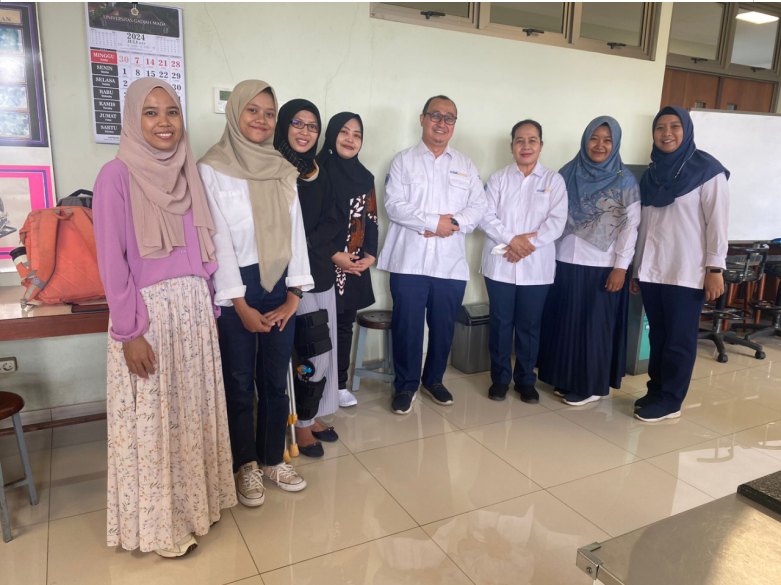
Dr. Maryani, M.Sc., head of the SPT Laboratory, welcomed the participants, and Dr. Eko Agus Suyono, M.App.Sc., Vice Dean for Research, Community Service, Collaboration, and Alumni Affairs, officially opened the event on Monday, August 22, 2024, at the SPT Laboratory, Building B. In his opening remarks, the vice dean emphasized the importance of research collaboration in the current era. The training included lectures/discussions on plant microtechnique and embryology, hands-on practice preparing embryology slides, analysis, and independent lab work. Lectures were given by Utaminingsih, S.Si., M.Sc., from the Plant Structure and Development Laboratory, with independent work supported for three days by lab assistant Ms. Prapti.
Dr. Slamet Widiyanto, M.Sc., officially closed the event on Wednesday, August 31, 2024. In his closing remarks, he reiterated that the goal of this training extends beyond the eight days and should serve as the beginning of future research collaborations. He encouraged participants to share the benefits of the training widely and provide feedback to the Faculty of Biology, especially the SPT Laboratory, for any improvements.
This training supports the Sustainable Development Goals (SDGs), particularly in fostering partnerships and cooperation (SDG 17), and aims to benefit the general welfare of Indonesian society (SDG 3). Additionally, it aligns with the government’s program to enhance the quality of education (SDG 4).
Hopefully, this training became a kickstart of collaboration and research partnership between the Faculty of Biology UGM and PT BISI International. The knowledge and technical skills gained during the training would be valuable for participants and related institutions.
The prevalence of adverse drug reactions in Indonesia ranges from 0.9% to 99%, depending on the type of drug, duration, and therapeutic dose. Each individual can respond differently to the same medication due to varying genomic reactions. This concept is known as pharmacogenomics. However, the medical devices used in pharmacogenomics, such as sensors, often cannot reach certain areas within the body. Additionally, a significant challenge in genomic data classification is the vast number of individual genes, which can number in the tens of thousands. Meanwhile, medical devices are limited and often inadequate.
In response to these challenges, Feny, a biology student at UGM, proposed the development of an Integrated Machine Learning-Based Biosensor Pharmacogenomics System as an advanced treatment method for Indonesia under the guidance of Lecturer Tyas Ikhsan Hikmawan, M.Sc., Ph.D.. Her idea was presented at the National Student and School Essay Festival (Genesis) and won the Silver Medal. The competition held by the Fatepa English Community at the University of Mataram on July 6-7, 2024, featured 315 entries. The competition included several stages: submission of a full paper, creation of a presentation video, preparation of a PowerPoint presentation, and a live poster presentation before the judges.
Her innovation involves using biosensors to monitor molecular interactions in patient treatments real-time. These ingestible biosensors provide information about organs’ physiological parameters, allowing them to monitor the genetic profiles related to internal conditions and diseases. The approach employs a random tree classification model that predicts personalized drug responses, side effects, and the patient’s pharmacogenomic variants.
The combination of pharmacogenomic treatment systems with integrated machine-learning biosensors will enhance drug safety. Implementing this system in Indonesia will reduce adverse drug reactions and side effects. Healthcare professionals can quickly monitor patients’ drug intervention responses, enabling them to make the best treatment decisions promptly.
[Author: Feny Nur Nucifera]
[Author: Feny Nur Nucifera]
Yogyakarta, 31 July 2024 – The lecture series on the agenda of The 7th International Summer Course in Sustainable Development: Sustainable Bioprospecting of Tropical Biodiversity continues. The next lecture raised topics related to insect bioprospecting with speakers Sukirno, Ph.D., lecturer at the Entomology Laboratory, Faculty of Biology UGM, and Prof Said Ali El Salamouny, a professor in the field of entomology, especially insect viruses at Cairo University, Egypt. The lecture panel was moderated by a lecturer from the Animal Systematics Laboratory in the Parasitology section of the Faculty of Biology UGM, Dila Hening Windyaraini, S.Sc., M.Sc.
Mr. Kirno delivered his presentation regarding insect bioprospecting. On that occasion, he also brought processed insect products in the form of fried grasshoppers and fried cocoons. Both foods, which were less commonly heard of, were tried by the participants. Some of them admitted that the taste was similar to shrimp, saying that insects could be a source of protein, like marine crustaceans such as shrimp.
Continuing the presentation regarding insect bioprospection by Pak Kirno, Prof. Said then delivered his presentation on entomology, especially related to agriculture and plant protection in the Middle East, especially Egypt. He provided new understanding, especially the differences in agriculture in Egypt compared to tropical countries like Indonesia.
The Summer Course agenda continues with a mushroom cultivation workshop at JeJamuran, a restaurant in Jogja which is famous for its culinary delights from various types of mushrooms. The workshop location is in the JeJamuran agrotourism area, not far from the main restaurant. Participants were introduced to various types of mushrooms, how to cultivate them and learned about the right environmental conditions for mushroom growth. As souvenirs, workshop participants can also take-home mushroom planting media that they can grow themselves at home.
Through this series of summer course agendas, it is hoped that it can broaden the participants’ insight, especially regarding the potential for bioprospecting resources which are not limited to certain plants, but also things that are not commonly developed in bioprospecting studies such as insects and fungi.

